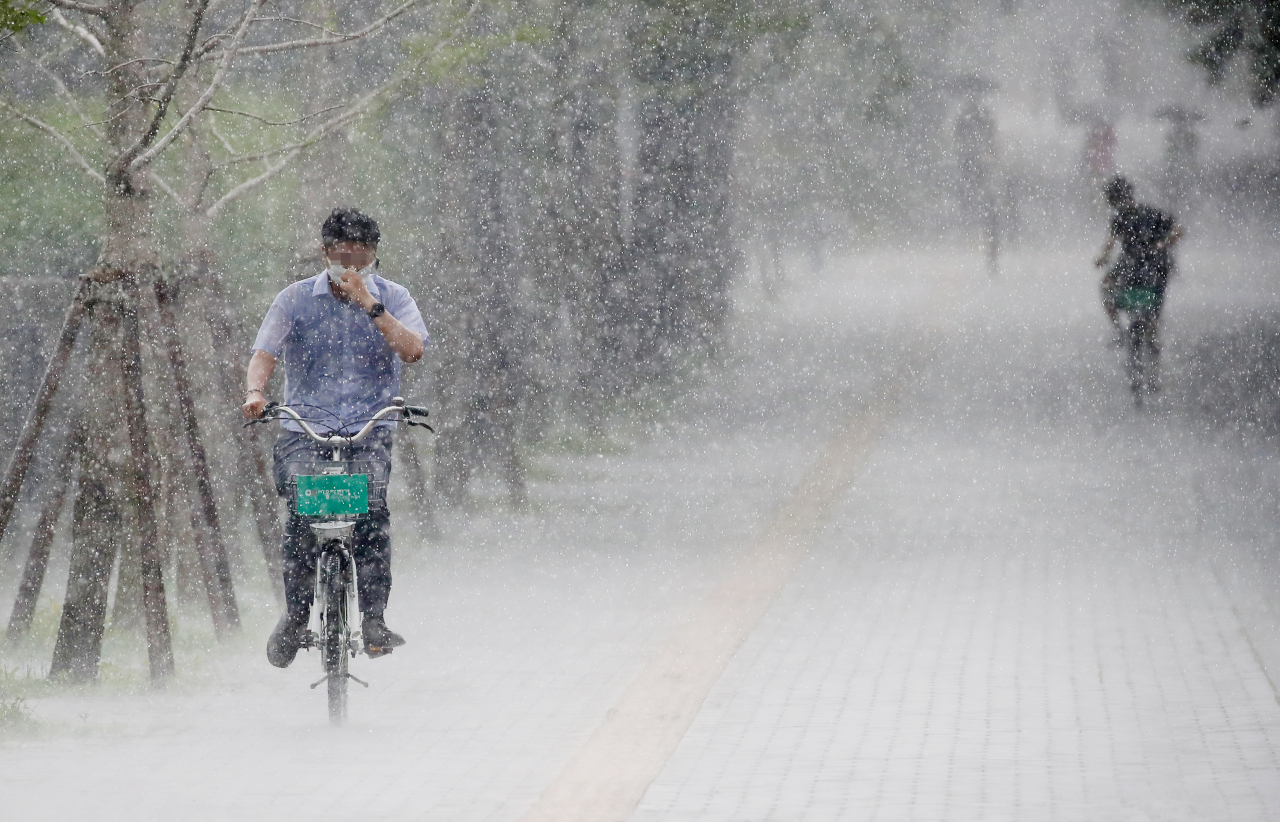Seoul’s bike rental service hits over 3 million users, yet losses continue
By Ko Jun-taePublished : July 26, 2021 - 11:37

Seoul’s city-run bike rental service, Ddareungi, has proven a success, but its popularity is feeding financial concerns for the city.
According to Seoul city government data, the number of accumulated users for Ddareungi reached 3 million as of May, accounting for nearly one-third of the city’s population.
The number of users skyrocketed since reaching 1 million in 2018, surpassing 2 million in May 2020 and adding 1 million more in just a year to hit 3 million in the first half of this year.
Ddareungi can be used by downloading the Seoul Bike smartphone application and by registering or logging in with Naver, Facebook or Kakao accounts. The app is available in both Korean and English.
The city government analyzed that the growing popularity of its bike rental service is largely due to increasing demand for supplementary means of transport to the existing public transportation system. The city also believes that the opening of additional bike routes across Seoul’s urban areas has prompted people to use the bikes more frequently.
Seoul said people tended to use the bike rental service most during weekday rush hours. The bike rental service recorded 13.7 million uses in the first half of 2021, up 30.3 percent from the same period a year earlier.
The bike service has also remained popular for its affordability. A one-time pass for an hour costs 1,000 won and 2,000 won for two hours, which can be paid via credit card or Kakao Pay.
As the bike rental service’s popularity grows, the city government plans to add 3,000 more bikes and 500 more rental stations this year. The city plans to own and operate a total of 40,500 bikes before 2022.
Yet such popularity has hurt Seoul city government’s bottom line, data shows. Seoul’s bike rental service has remained in the red for five consecutive years, with yearly losses growing over time. The annual losses grew from 2.5 billion won ($2.1 million) in 2016 to nearly 10 billion by 2020.
Seoul is not the only local government with loss-making bike rental services. Suwon, Gyeonggi Province, discontinued its service in September 2019, followed by Goyang, Gyeonggi Province, in May 2020, all due to mounting losses.
To fight the losses, Seoul said it is planning to start running advertisements directly on its bikes to drive profit.
Current statutes limit advertisements from being posted on bikes, and the city government has said it is working with the Ministry of the Interior and Safety to introduce a regulation that would legally allow advertisements on the bikes.
If allowed, the city plans to start looking to sell advertisement slots on the bikes to companies or services targeting young users between their 20s and 40s, which account for most of the user base of the Ddareungi service.
According to Seoul city government data, the number of accumulated users for Ddareungi reached 3 million as of May, accounting for nearly one-third of the city’s population.
The number of users skyrocketed since reaching 1 million in 2018, surpassing 2 million in May 2020 and adding 1 million more in just a year to hit 3 million in the first half of this year.
Ddareungi can be used by downloading the Seoul Bike smartphone application and by registering or logging in with Naver, Facebook or Kakao accounts. The app is available in both Korean and English.
The city government analyzed that the growing popularity of its bike rental service is largely due to increasing demand for supplementary means of transport to the existing public transportation system. The city also believes that the opening of additional bike routes across Seoul’s urban areas has prompted people to use the bikes more frequently.
Seoul said people tended to use the bike rental service most during weekday rush hours. The bike rental service recorded 13.7 million uses in the first half of 2021, up 30.3 percent from the same period a year earlier.
The bike service has also remained popular for its affordability. A one-time pass for an hour costs 1,000 won and 2,000 won for two hours, which can be paid via credit card or Kakao Pay.
As the bike rental service’s popularity grows, the city government plans to add 3,000 more bikes and 500 more rental stations this year. The city plans to own and operate a total of 40,500 bikes before 2022.
Yet such popularity has hurt Seoul city government’s bottom line, data shows. Seoul’s bike rental service has remained in the red for five consecutive years, with yearly losses growing over time. The annual losses grew from 2.5 billion won ($2.1 million) in 2016 to nearly 10 billion by 2020.
Seoul is not the only local government with loss-making bike rental services. Suwon, Gyeonggi Province, discontinued its service in September 2019, followed by Goyang, Gyeonggi Province, in May 2020, all due to mounting losses.
To fight the losses, Seoul said it is planning to start running advertisements directly on its bikes to drive profit.
Current statutes limit advertisements from being posted on bikes, and the city government has said it is working with the Ministry of the Interior and Safety to introduce a regulation that would legally allow advertisements on the bikes.
If allowed, the city plans to start looking to sell advertisement slots on the bikes to companies or services targeting young users between their 20s and 40s, which account for most of the user base of the Ddareungi service.





![[Herald Interview] 'Amid aging population, Korea to invite more young professionals from overseas'](http://res.heraldm.com/phpwas/restmb_idxmake.php?idx=644&simg=/content/image/2024/04/24/20240424050844_0.jpg&u=20240424200058)











![[KH Explains] Korean shipbuilding stocks rally: Real growth or bubble?](http://res.heraldm.com/phpwas/restmb_idxmake.php?idx=652&simg=/content/image/2024/04/25/20240425050656_0.jpg&u=)

